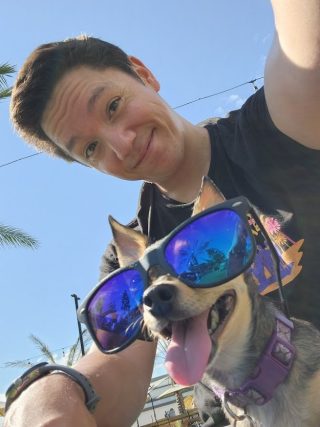How to Earn Your Start in Games: Insights from Inside
Seven Ripple Effect developers share their personal stories and best advice for breaking into the industry.

As anyone who’s ever tried to enter a creative field can tell you, landing a full-time role can be extremely difficult. That’s why the seasoned team at Ripple Effect has long been committed to nurturing up-and-coming talent and creating opportunities for students. Not only do we offer paid summer internships across a variety of disciplines (the application process opens each fall), we also host a cohort of Bovard Scholars annually.
The University of Southern California Bovard Scholars program “helps high-achieving students with financial need gain admission to and succeed at the nation’s top universities,” including USC’s own venerated game design program. This year, in addition to providing our cohort with a tour of the studio, the students were able to sit down with seven Ripple Effect team members for an in-depth Q&A. The number one question: “How did you transition from student to professional?” With thanks to our team members, here are their stories and their best advice for anyone looking to follow in their footsteps.

Chris Yoon, Senior VFX Artist
How Chris started in the games industry:
“I went to college for environmental art and props, and my first few jobs were actually in that field. Then, on the job, I was building props for effects artists to destroy, they were very busy. I ended up talking with them, and they taught me the effects systems for the Skylanders game. This was my intro to effects and I loved it! I was able to learn on the job and transitioned into a full-time effects artist. I didn't really see that as a path when I was younger, and it was cool to know that you can pivot on the job.”
Chris’s best advice for aspiring game VFX artists:
“Dabbling in Unreal and Houdini – are two really good applications to have experience in. Unreal will give you all the basic skills you need to learn in order to become a game VFX artist. Unreal Engine is free, well documented and has a large online community to help you with any issues you might come up against. We look at Unreal frequently for inspiration and/or examples. Houdini skills are very useful for texture creation and creating realistic simulations. The sky is the limit with this tool, it is commonly used in TV, movies, commercials and games. Artistically it can be used for realistic or stylized effects, it can do it all! Houdini simulations and renders favor film development, so the fun and skill come in learning how to convert your work to something that is video-game friendly. The game side of rendering is a little tricky because you're trying to make something look amazing as cheaply as possible because you want to run it at 60 times a second.”

Gabriel Lacayo, Software Engineer
How Gabriel started in the games industry:
“I knew I wanted to code and learn how to make games, so when applying to colleges, I was mostly applying to computer science. I went to USC, which luckily has a computer science games program, that has that CS foundation but with game-making classes, both technical and design. So that is what I wanted to do; I don't know what else I would be doing if I wasn't making games. Then when I tried applying for jobs, I didn't really hear back at all until my junior year when I applied to Ripple Effect. That's when I landed my first internship and my first call back in interviews and stuff. And luckily, they liked me enough to hire me full-time after I graduated.”
Gabriel’s best advice for aspiring game programmers:
“For programming, just learning how to code – it’s kind of that simple. I mean, it's hard to do, but the steps are simple. There's a lot of different languages that you can learn from. If you want to go into games, I'd say just learning C++ is hands-down the best one to know because most game engines will be using C++. I know Unity uses C#, but if you know C++ then transitioning to C# is not that bad. There's also Python that gets used in a lot of places. Java seems the same as C#, so if you know one, you know the other. And with learning how to code, you can start to make your own games to expand on your skills. Just start small so you’re able to finish something first, then move on to something bigger.”

Juan Meza, Technical Animator
How Juan started in the games industry:
“For me, I would say the biggest sort of stepping stone was when I was in college and got an internship at this animation studio called Titmouse where I was doing, like, digital painting and animation. After I graduated, I had a really hard time finding any sort of animation work, so I ended up pivoting by accident into games. I had a job at a small game studio working as a contractor for random projects, and for a long time, I really didn't have a sort of clear focus. I got the job [here at Ripple] and I finally started planning a bit more in terms of like, ‘Okay, now what do I want to do?’ And now I’m in this position where I do have a choice in the kind of work that I want to do.”
Juan’s best advice for aspiring technical animators:
“For tech [animation], I would say it's pretty similar to what Gabriel said: just picking up any game engine and 3D software package is probably the best way to get your answer. Just make stuff! Generally just making stuff and showing it to people is how you end up with technical art experience.”

Jenny Szmurlo, Senior Technical Artist
How Jenny started in the games industry:
“In college, I was an Entertainment Arts and Animation major studying traditional animation. I worked hard and landed a competitive internship at Nickelodeon. But I graduated at an inopportune time for the animation industry and there just weren’t any jobs. Eventually, I started doing special effects makeup. I did that for a few years, and between gigs continued to work at In-N-Out Burger. Some of my co-workers ended up at Blizzard Entertainment, and they were like, ‘You need to apply.’ So I did, and that is how I ended up in the games industry.
Jenny’s best advice for aspiring game technical artists:
“Python is super helpful if you want to be a technical artist, but also just be curious – like, how do all the parts of this fit together? Because once you start trying to figure out how all the parts come together, you'll start unraveling a technical mindset that allows you to kind of think procedurally. It doesn't matter where you do it or how you do it, but try to think of those things that are repetitive and how you can make them easier, quicker, less error-prone, and more efficient.”

Cecil Kong, Software Engineer Intern
How Cecil started in the games industry:
“I would say a pivot point in my path goes back to before college. For most of my life, I've been doing art. Growing up, I was like, ‘I'm gonna become an artist one day,’ whether it was digital or animation or modelling or just anything art, right? Until I eventually realized through high school that I didn't really want to do art as a group. Art was still my passion, so I wanted to, like, keep it as a hobby, but maybe not do it as my daily job, right? At the time – and still, now – I followed a ton of artists on social media, and some started working on their own indie game projects. They would post concept art and write blogs about the development process. And then I was like, ‘Oh, wait a minute, people make games or people make art for games. That's a possible career option, right?’ So initially I was looking into making art for games but because I was like, ‘Oh, I'm not sure if I want to do art,’ I was like, ‘Okay, what is something else that I think I have a background or a strength in that I can pursue that is still related to games?’ So that's when I started looking into programming. I actually applied everywhere as a computer science major. And now I'm at USC as a CS games major, and I would say since then, this internship has really prepared me for the industry.”
Cecil’s best advice for aspiring game engineers:
“For games, I think you need to be willing to self-learn a lot – you know, looking up engines or looking at whatever tools you might need to use for your path, whether it's art tools like Maya or programming like Unity or other engines. I think for a games- or art-related field, having a portfolio is really important, so you want to be able to get projects on that portfolio. The other thing about games is that it's highly collaborative, right? You're going to have a really hard time creating the programming, the art, the music, the design, everything by yourself. So try to find, like, a support group or a group of people who are just as passionate about games as you, that kind of stuff. And then for programming, I would say just preparing for the challenge is not easy – at least it hasn't been for me! Be ready to spend a lot of time trying to fix things, and take the time and have the patience to be able to overcome the challenges that you run into.”

Enzo Sprigg, Senior World Artist
How Enzo started in the games industry:
“In art school, I focused on illustration. I thought I'd be a freelance illustrator, but I started to notice that all of my art teachers would work on their side projects while we were doing art projects. I started asking them about what a freelance career is like, and they were struggling. So then I started going home thinking that if I choose art, I'm going to be struggling. Like, that was really something I wanted to figure out.
And then Street Fighter II came out, and I was looking at that game and I was like, ‘This is not Pac-Man anymore. A programmer can draw Pac-Man; an artist draws Chun-Li.’ Once I figured that out, I'm like, ‘Okay, I'm going to have to focus on this.’ So I did this thing where I bought this big piggy bank, and I put it in the center of my family's dining table, and I said, ‘That piggy bank is to help me buy a computer.’ At the time, the Amiga 500 had just come out and I thought, ‘I'm going to get a computer, and I'm gonna learn pixel art.’ If I look back, I went from a struggling artist to a computer artist. And it changed everything.”
Enzo’s best advice for aspiring game artists:
“For my role, it's important to know technical things, like, getting into an engine. Unreal is a great option because it's actually very comparable to what we use. But also when we interview world artists, we ask them artistic questions, we ask them compositional questions and colour theory. Who's your favourite artist? How would you approach the composition of a space? Those are artistic things aside from technical things – you know, how do you react to that? A big part of what we do is very visual, so we like to see the technical side of things but we also want to know what kind of artists you are, and what excites you. With that said, if you can download a reel and recreate one of your favourite paintings, that is a perfect way of doing both.”

Warren Post, Sound Designer
How Warren started in the games industry:
“In high school, I had no idea what I was going to do. One day, I chanced upon an article that USC was starting a games program. Before that, there was no game education at all in academia. And I thought, ‘Well, I like games. I want to be creative. I'm going to apply and see if I can get in.’ That was my naive thought process as a teenager. However I was able to get into the film school, and I took some classes, one of which was a production class that was taught at the time by the studio head of Sony Santa Monica. The class was half instruction and the other half, they brought in guest speakers. One time they brought in the, at that time, game director for God of War III and asked everyone around the room, ‘So what are you interested in?’ And I had mentioned that I was interested in pursuing audio. He said, ‘Well, after this class, follow up with me.’ So being the shy kid that I was, I went home, but the following day, I got an email from my teacher. He said, ‘Were you really serious about going into audio? If so, can you please email Todd?’ That chance moment got me into the path I'm on right now. It's through there that made connections and sort of set me on this journey that I've been on with audio. But you know, so much of my education has also happened outside of school. It's been finding mentorship, just being able to connect with people that have been doing this craft for so long or so, experiencing this discipline that inspired me.”
Warren’s best advice for aspiring game designers:
“There are a lot of free and inexpensive digital audio workstations like Reaper that you can download and start making designs. If you're ever looking for a starting point, that’s a great place to look. Do a redesign, take a scene from a film, a television show, or even a game that's inspirational to you and do your own treatment of it. Another option is to learn from the master, so if there's a sound that has always been inspirational to you like the velociraptor call in Jurassic Park to research how those sound designers put those all together. I would then echo what everyone else has said about portfolio: showcase your work in a demo reel. I've always found that the sweet spot is about a minute to a minute and a half. That's usually when people have the most amount of attention to look at your work. But always put your best work up front, and it'll be a great portfolio piece for you to just demonstrate your own abilities.”
Once again, we’d like to thank our team for their time, and we wish all the Bovard Scholars the best of luck. If you’re an aspiring game creator, we hope these insights have helped. Ready to make your play? Then explore our current opportunities for a chance to join our team directly.

